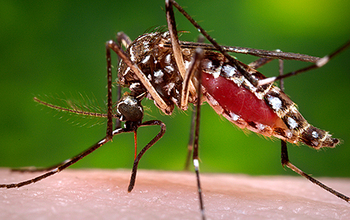 February 29, 2016 - An NSF-funded project on the effects of climate, land use, and socioeconomic conditions on vector-borne disease transmission, such as the Zika virus, was featured in an NSF press release recently. Studying interacting factors allows researchers to understand the "risk landscape" for mosquito-transmitted diseases, according to Sadie Ryan, an ecologist and medical geographer at the University of Florida who is collaborating on the research. Taking a local approach then broadening it, the scientists believe, will allow them to find out when and where interventions -- such as in vector control, healthcare infrastructure, environmental modification, education, and climate change early warning systems -- may be most effective.
February 29, 2016 - An NSF-funded project on the effects of climate, land use, and socioeconomic conditions on vector-borne disease transmission, such as the Zika virus, was featured in an NSF press release recently. Studying interacting factors allows researchers to understand the "risk landscape" for mosquito-transmitted diseases, according to Sadie Ryan, an ecologist and medical geographer at the University of Florida who is collaborating on the research. Taking a local approach then broadening it, the scientists believe, will allow them to find out when and where interventions -- such as in vector control, healthcare infrastructure, environmental modification, education, and climate change early warning systems -- may be most effective. Headline News
Seeking Zika: Where and When Will Zika-Carrying Mosquitoes Strike Next?
 February 29, 2016 - An NSF-funded project on the effects of climate, land use, and socioeconomic conditions on vector-borne disease transmission, such as the Zika virus, was featured in an NSF press release recently. Studying interacting factors allows researchers to understand the "risk landscape" for mosquito-transmitted diseases, according to Sadie Ryan, an ecologist and medical geographer at the University of Florida who is collaborating on the research. Taking a local approach then broadening it, the scientists believe, will allow them to find out when and where interventions -- such as in vector control, healthcare infrastructure, environmental modification, education, and climate change early warning systems -- may be most effective.
February 29, 2016 - An NSF-funded project on the effects of climate, land use, and socioeconomic conditions on vector-borne disease transmission, such as the Zika virus, was featured in an NSF press release recently. Studying interacting factors allows researchers to understand the "risk landscape" for mosquito-transmitted diseases, according to Sadie Ryan, an ecologist and medical geographer at the University of Florida who is collaborating on the research. Taking a local approach then broadening it, the scientists believe, will allow them to find out when and where interventions -- such as in vector control, healthcare infrastructure, environmental modification, education, and climate change early warning systems -- may be most effective. 










